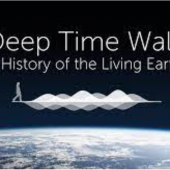
Abstract: At Schumacher College, Dartington, UK in 2008 we introduced the Deep Time Walk – a transformative learning experience in which college participants walk 4.6km in the countryside of the Dartington Estate representing the entire 4,600 million years of our planet’s history. The aim of the walk is to increase the ecological awareness of participants by giving them an embodied experience of the immense age of our Earth. At certain points during the walk a facilitator explains key events in earth history, such as the formation of the planet and the first appearance of living cells. Here we assess the effectiveness of the Deep Time Walk offered to eleven distinct groups of walkers during 2022 -2023. Participants on each of the eleven Deep Time Walks were asked to respond to a simple questionnaire asking them to quantify how much of seven qualities they felt immediately before and immediately after their walk (these were: Awe and Wonder, Sense of Earth’s Ancientness, Connection to Nature, Consequences of the Crisis, Hope, Commitment to Personal Change and Commitment to Political Change) . In total, 153 participants took part in the eleven walks and responded to the questionnaire. Analysis of the data showed a highly statistically significant increase across all seven qualities (p<0.00001 for each quality), suggesting that the Deep Time Walk is an effective means for developing and enhancing ecological awareness and commitment to action in these times of severe global crisis. Qualitative data were not collected during this phase of the study due to time limitations during walks. We recognise the importance of this kind of data and are devising ways of gathering it for both past and future walks.
Continue Reading
Abstract: One way to disrupt traditional Eurocentric teaching practices is through modifying curriculum in classes. Particularly, in an English Composition 101 course, an ongoing assignment called the Poetry Journal may assist students in thinking critically and reflexively. The concept was inspired by a high school English teacher, Brett Vogelsinger (2016), called “4 Reasons to Start Class with a Poem Each Day.” His four reasons: 1. Poems are short; 2. Poems are intense; 3. Poems connect (to other readings); 4. Poems inspire (writing). When building the assignment for a community college class, an instructor may make intentional (disruptive) choices for the poems. This article explores the project, which is grounded in culturally sustaining (Paris, 2021) and disruptive pedagogies (San Pedro, 2018)—both of which encourage the rethinking and dismantling of traditional Eurocentric-based instruction—and how the author (full-time faculty at a community college) applied said pedagogies to a specific in-class student activity to engage students in critical and reflexive thinking.
Continue Reading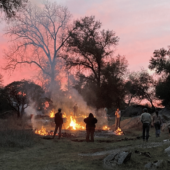
Abstract: The Keepers of the Flame Initiative, now in its fifth year, is a dynamic partnership between cultural fire practitioners, UC Davis faculty, and a diverse study body. This experiential learning initiative at the University of California, Davis centers Indigenous Fire Workshops, focusing on cultural fire. By centering Indigenous science and teaching approaches, this initiative inherently becomes high impact. High Impact Practices (HIPs) are pivotal educational interventions that promote holistic student development and experiential learning. These practices encompass features such as setting appropriately high expectations, experiences with diverse people and circumstances, sustained student engagement over an extended period, meaningful interaction with faculty and peers, public demonstration of learning, real-world relevance of classroom learning, and structured opportunities for reflection. The Keepers of the Flame Initiative incorporates two types of powerful high impact practices: collaborative group projects and community-based learning. These educational practices significantly enrich student learning and particularly benefit historically underserved students as well as broader student populations. I analyze HIP features within the Keepers of the Flame Initiative using survey data gathered in winter 2023, while also delving into the importance of Indigenous-led educational approaches. Indigenous perspectives and educators are crucial in broadening educational approaches, providing a pathway to uphold sovereignty of diverse knowledge systems, and nurturing a sense of responsibility towards land stewardship and environmental justice.
Continue Reading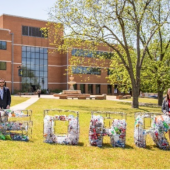
Abstract: Southern Arkansas University has developed the SOAR Sustainability Conference to spotlight current sustainability-related efforts. SOAR, representing the southern Arkansas region, was added to the conference name to signify the area of emphasis for the event. This spring conference event has been held in April of 2022 and 2023. The 2023 conference included over 50 presenters from academia, private businesses, government agencies, and volunteer organizations. Session topics were aligned with the critical components of sustainability education including anticipatory thinking, empathy, change of perspective, justice, responsibility, and ethics. Surveys were distributed to SOAR conference attendees to gauge their level of attitudes, knowledge, and behavior regarding sustainability issues. Responses were very positive overall, showing gains in attendees’ attitudes, knowledge, and behavior between 2022 and 2023. The behavior category showed the largest annual increase while knowledge gains over the same period were lower. Overall, the SOAR Sustainability Conference has shown success in engaging students and community stakeholders to take part in this effort to address sustainability-related challenges in the area.
Continue Reading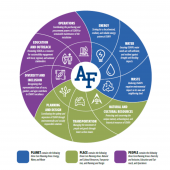
ABSTRACT: In this paper we offer an approach to sustainability-related education that can help students integrate the lessons they are learning in the classrooms to the type of real-world applications they will encounter in the workplace. We believe that by using our campus as a living-learning laboratory and engaging students in hands-on projects within a campus lab that directly contribute to one of their institution’s leading sustainability initiatives, we can unlock the highest levels of educational achievement and student satisfaction. We describe our course as intentionally designed because we have developed it with a specific purpose that goes beyond the stated learning objectives. Our course not only addresses recognized institutional and course-level educational outcomes, but also uses a community engagement approach that also directly supports important aspects of an enterprise-wide Sustainability Strategic Plan. We present relevant literature, highlight the significance of our approach to sustainability education, and describe its impact at our institution and in the community. We then offer detailed descriptions of our course’s activities, discuss lessons-learned and suggest future potential avenues of research and application. We hope this case study may prove to be an exemplar or a catalyst for other institutions of higher education as well as inspire further research aimed at improving sustainability education.
Continue Reading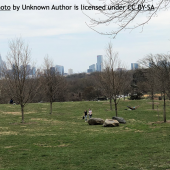
Abstract: This case study discusses the implementation of a park audit project with undergraduate college students in teacher education and public health programs. With a focus on drawing attention to the importance of urban green spaces in these two professional fields, the design of this project extended course activities into local parks. Students prepared to conduct park audits by engaging with course material focused on the importance of urban green spaces for individual health and children’s development, as well as inequities in access to high quality parks. The capstone of the course project was the audit of parks using the Community Parks Audit Tool (CPAT) in which each student assessed several parks in their local communities and documented their findings. This article discusses the contextual relevance of this project, its value in increasing attention to environmental considerations in the education and public health fields, as well as student responses to the implementation of the project in these specific classes.
Continue Reading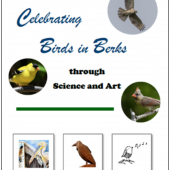
Abstract: Sustainability depends on biological diversity and the investment of individuals and communities in maintaining ecosystems. To engage the public in local biodiversity—specifically birds—we developed a program combining science and the arts. The science involved a group field experience, led by area birders guiding observations and providing information on the birds; the arts produced written reflections and visual representations of the birds and birdwatching. The integration of experiences, as manifested in field notes, artwork, and writing, reinforced understanding of, as well as interest in, birds and their natural habitats. In short, the data confirmed that participants gained a deeper appreciation for the natural world when seeing it in the contexts of both science and creative expression.
Continue Reading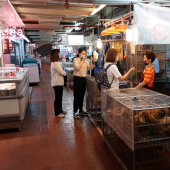
Abstract: This article provides a case study of place-based sustainability education on the use of plastic bags in a wet market in Hong Kong. We organised two field trips and engaged 20 students in conducting both quantitative and qualitative research in the wet market to examine single-use plastic consumption. Our research has found that at least 1 million plastic bag is consumed on a daily basis in all the wet markets in the city of Hong Kong. Qualitatively, we found that some of the vendors may use plastic bags as a sale strategy and to engage with customers in conversations. In contrast to the conventional schooling that promote sustainability or plastic reduction in a very abstract sense, the place-based education we attempted aims to critically rethink the concept and knowledge of sustainability in ways that also empathize with the local tradition, and remain critical of modern corporate branding, and modernization discourse. The paper ends with a discussion on reflecting plastic use in traditional wet markets in contrast with chained supermarket shifting to more plastic pre-packages.
Continue Reading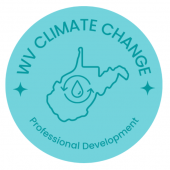
Abstract: The West Virginia Climate Change Professional Development (WVCCPD) Project was developed in 2019 as an effort to engage West Virginia K-12 teachers and informal educators in climate change professional development to encourage learning and action. Started by astronomy educators who are passionate about climate change, the project has been an experiment that has iteratively grown each year. By bringing in social science experts, communication specialists, community activists, master teachers, and learning how to best support teachers and their students through misconceptions and empowering action, we have engaged over 130 W.Va. educators. WVCCPD represents a promising case study for how educators can come together across disciplines and institutions to build an engaging climate change learning community, even in West Virginia, an area that is known for fossil fuel extraction. We hope this paper informs other teacher education practitioners.
Continue Reading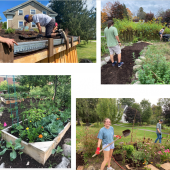
Abstract: This case-study supports the implementation and social investment in university campus community gardens as an interdisciplinary resource for academic research, extra-curricular activities, and community building. Using a permaculture design model, the St. Lawrence University community permaculture garden in Canton, New York State exists to enhance the diverse academic curriculum and varied community engagement opportunities to provide experiential and interdisciplinary learning opportunities for students, faculty, staff, and remaining stakeholders. This case-study will focus on one of St. Lawrence University’s student-led clubs, its operations, history, and challenges (e.g., participant transience). Our findings suggest that campus permaculture gardens require adequate investment, including financial and academic support. The development of a conceptual seasonal and academic community calendar provides a fundamental framework for operations and governance. The sheer number of opportunities and broad capacity of the club and the presence of physical student space brings meaningful accessibility and community engagement. Over time, the club and garden has remained resilient due to a holistic approach which keeps the bigger picture in mind. Each year the club faces a variety of challenges and obstacles, yet such experiences have provided opportunity for adaptation and evolution. Recommendations can be used to support a replicable model for other educational environments and communities in both urban and rural areas, interested in developing a permaculture garden as a resource that improves social cohesion during a time of ecological fatigue, social unrest, the COVID-19 pandemic, and climate change.
Continue ReadingAbstract: In her narrative, Rioux argues for the significance of teaching place-based ecocomposition to diverse and multilingual writing students in order to emphasize and demonstrate the interconnectivity between all places and spaces that we inhabit despite human-made geographic boundaries. Addressing global issues with writers who represent various places around the globe enables writing students and instructors to hone in on the international nature of climate change while emphasizing the exigence that our natural context requires. Based on primary research, the author examines how teaching place-based ecocomposition to a uniquely diverse student group affects the writing students’ recognition of the interconnectivity of all places despite geographic location. Rioux explores how diverse environmental writing students perceive the effectiveness of a place-based course as it pertains to its objectives of helping students recognize their role within our extended environments, how to become more aware of the interconnectedness that combines and connects all places, and general environmental concerns that mark the Anthropocene. Providing pedagogical insights, Rioux also shares what the students find most effective in regards to course materials, design, and overall pedagogy, as it is imperative for our collective future to understand how to engage and motivate the next generation’s thinkers, writers, and Earth-dwellers.
Continue Reading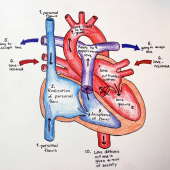
Abstract: This case study follows the eight-year development of an environmental anthropology course, beginning with my own failure as a teacher to provide students an adequate way of thinking and acting amid planetary crisis. It then turns to a diagnosis of three challenges students face when thinking about global ecological futures: (1) an inability to act, (2) an inability to imagine how an individual can make a difference, and (3) an inability to conjure an adequate sense of hope. For each of these challenges, I introduced a conceptual metaphor designed to help us think anew, where a conceptual metaphor is a trope that enables thinking about one conceptual domain in terms of another. The metaphor of wayfaring helped us overcome the conviction that one must become an expert before acting. The metaphor of seed planting helped us reimagine how an individual can contribute to larger-scale change. Finally, I introduce two new conceptual metaphors for thinking about hope amid planetary crisis—weedy invasions and broken jars. By working with these tropes, I propose an alternative way of thinking about hope that does not rely on a sense of optimism. Along the way, I make two broad arguments. First, thinking through novel conceptual metaphors, what I call metaphor work, is a worthwhile technique for approaching planetary crisis with students. Second, an undergraduate seminar is an excellent place to experiment with new ways of thinking about, and living in, the Anthropocene.
Continue Reading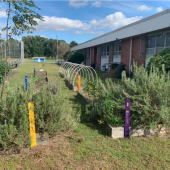
Abstract: This case study provides insights into a collaborative effort involving D.C. Virgo Preparatory Academy, a public university-run lab school in downtown Wilmington, North Carolina. The article overviews the combined efforts of DCVPA staff, university faculty, and community partners to engage the students in unique, hands-on learning experiences, particularly in the STEM areas. Students have taken the initiative to serve as change agents and leaders in the work. Several efforts at the school, including a composting program, a recycling effort, a seedling project, and a mycology lab, provide a window into dynamic experiential learning that has brought the university and school together.
Continue Reading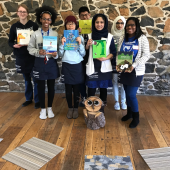
Abstract: A partnership between a university and local arboretum was expanded to include the campus library as a collaborator. Instead of having sustainability-themed programming between the two institutions focus on just the environmental components of the Sustainable Development Goals (SDGs), a library brings attention to literacy and information access across all aspects of the partnership. We share two public programs held between our university and an arboretum with strong involvement by the library in the development and execution stages, thereby increasing the connections across the SDGs and progress towards the 2030 agenda.
Continue Reading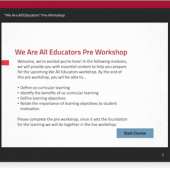
Abstract: Staff members play an important role in guiding students through living lab sustainability projects at Harvard University. Since there are significant opportunities for co-curricular learning in these settings, we created the “We Are All Educators” professional development workshop to empower those staff members to optimize and track student learning throughout these projects. In this case study, we will briefly summarize key principles of CCL and discuss its benefits as a tool for sustainability education in higher education. We will also describe our planning and implementation process for the workshop, the content of our training materials, and the results. Finally, we will end with key takeaways, as our workshop may be applicable to co-curricular learning in a variety of higher education contexts.
Continue Reading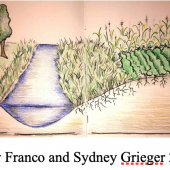
Abstract: This study examined how placemaking curricula shaped teacher candidate (candidate) knowledge, dispositions, and skills to understand, appreciate, and sustain local diversity, as evidenced through candidate reflections and products created in an elementary teacher education course integrating civic science concepts and practices into elementary classrooms. This study explored how placemaking curricula engaged community stakeholders in meaningful shared inquiry on real-world challenges, while meeting state science education standards. Placemaking inquiry projects developed by candidates focused on soil and water conservation, and sustaining diversity in schoolyard spaces. Curricula engaged candidates in learning soil and water conservation techniques from local farmers and conservation leaders, then developing and sharing co-authored civic science children’s books on conservation topics aligned to grade-level standards. As further placemaking curricula, candidates partnered with elementary teachers and students to guide schoolyard observations, designs, and models constructed to sustain diverse abilities, cultures, and ecologies. Presentations to parents and peers celebrated shared insights.
Continue Reading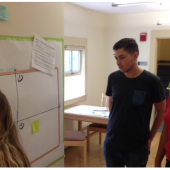
Abstract: Sustainability education can productively focus on concepts and/or skills, each playing an important role in preparing students to promote sustainability in society. We describe here the skills-based curriculum in an environmental sustainability practicum designed for undergraduate students. Although our curriculum provides training in numerous relevant skills, we focus here on one in particular: scenario planning. Originally developed in the 1970s by Shell Oil to develop robust business strategies in the face of future uncertainties, scenario planning is applicable to any planning domain where future conditions may be driven by the outcome of critical unknowns. For example, planning for effective community resilience in the face of climate change may depend on the degree of government support for renewable energy systems. In this practicum, students work in teams of 3-4 on the same challenge: Assess a specified human-natural system for its vulnerability to climate change in the next 20 years and develop solutions that effectively increase the resilience of the system in the face of uncertainty.
Scenario planning involves six steps: (1) Identify driving forces for future changes; (2 and 3) Identify certainties and uncertainties for future conditions; (4) Rank uncertainties by the degree to which they might affect future conditions; (5) Create a 2×2 grid of possible future scenarios based on the two most influential uncertainties; and (6) Describe the future world in each of these four scenarios. Using creative ideation techniques developed by IDEO for their Human-Centered Design methodology, students then use these four scenarios as the basis for envisioning effective strategies for promoting resilience regardless of how the critical uncertainties unfold (adaptive planning) or for influencing uncertainties to increase the probability that preferred scenarios manifest.
Abstract: In 2008 astronauts aboard the International Space Station captured an image of sunlight as it passed through the Earth’s thin atmosphere, described as the thin blue line of “all that stands between life on Earth and the cold, dark void of space.” At the center of sustainability education is a discourse of climate change and life’s demise on the planet. In this short article, the contributing role of the United Nations University’s Regional Centres of Expertise (RCEs) for sustainability education is explored with respect to community-based climate change adaptation, notably through RCE Dhaka (Bangladesh) as an example of the challenges and opportunities for climate change adaptation in one of the most heavily populated megacities of the Global South.
Continue ReadingAbstract. This study investigates whether children at an urban place-based environmental education camp can develop three dimensions of eco-character development after week-long participation: Head (knowledge), Hand/Feet (action), and Heart (care/connection). Using a community-based and inquiry-driven curriculum, campers practiced the roles of an arborist, ecologist, and environmental steward. Fifty-five Campers were assessed on all three dimensions using a 10-question pre/post-survey. An overall increase in content knowledge, relationships with nature, and motivation for pro-environmental behaviors were found. Outdoor environmental education summer camps and other out of school experiences may be the new avenue for educators and instructors to consider when trying to promote positive eco-character development in future generations.
Continue Reading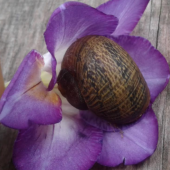
Abstract: Ecoliteracy can be defined as an understanding of natural systems and connections between biotic and abiotic factors within sustainable future. Green consumerism is an observable side of ecoliteracy. The aim of this study is, therefore, to examine the long-term effect of environmental education programmes intended for in-service teachers in terms of behavioural change. The teachers were joined ecopedagogy-based education programmes funded by TUBITAK (The Scientific and Technological Research Council of Turkey) in Turkey and were followed up after seven years. The methodology of the study was mixed method within a case study. Quantitative data were collected by a survey and analysed by R statistics. Qualitative data were analysed by content analysis. It was found that the green consumer behaviours of in-service teachers have improved in the long term. However, it is needed more follow up studies within different time frames and country comparison studies in the future.
Continue Reading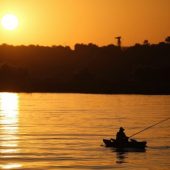
Abstract: This paper describes the outcomes of a game designed to teach advanced leadership skills, specifically influence and negotiation strategies, to current and aspiring sustainability professionals at Virginia Tech’s Center for Leadership in Global Sustainability. In the game, students assume the role of a key stakeholder and practice principle-based negotiation, conflict management, consensus building, and related influence skills needed by professionals working on complex sustainable development challenges such as the transboundary resource issues
regarding hydropower and watershed management. We collected pre- and post- survey data to assess the effectiveness of the simulation in developing students’ negotiation and influence skills. Results suggest that the training helps students develop confidence in using influence and negotiation skills and feel more competent and better prepared to serve as leaders in the field.
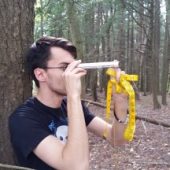
Abstract: Predicted changes in climate have generated interest in strategies to mitigate emissions of greenhouse gases and increase education on the topic. Our study involved an instructor-led team of 19 biology undergraduate students that aimed to quantify tree carbon sequestered on 67 hectares of a university campus forest near Utica, New York, and estimate its monetary value as a carbon offset. We identified individual hardwood and conifer trees and measured diameter at breast height (DBH) of 343 trees within fifteen 0.04-hectare sample plots during a 3-week period. We estimated total campus forest carbon to be 7,678 Mg and annual sequestration to be 82 Mg C/year. We also found additional educational value of this voluntary field research project beyond traditional ecology field exercises. Campus managers could choose to count sequestered carbon as an offset to annual CO2 emissions from campus operations. Although our campus is not eligible to sell the accumulated carbon, we calculated a one-time offset to be worth $143,397 on the voluntary carbon trading market. Future studies could benefit from the efficient sampling methodology we used to quantify carbon contained in large forest areas and increased student learning from project-based field exercises.
Continue Reading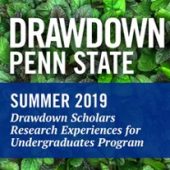
Abstract: Podcasts are increasing in popularity as an educational tool in recent years, but there remains a lack of podcasts that focus on climate change. The goal of this project was to create a series of audio files that address global warming solutions in the state of Pennsylvania, with each episode based upon a drawdown solution. Project Drawdown is a nonprofit organization that models how to reach “drawdown”— the future point in time when levels of greenhouse gases in the atmosphere stop climbing and start to steadily decline. This audio collection contains new and original podcasts addressing each Project Drawdown sector of global warming solutions, such as materials and waste, electricity generation, and land use. To highlight efforts in Pennsylvania, thirteen interviews were conducted with scientists, journalists, and professionals from organizations across the state, such as Feeding Pennsylvania, Southeastern Pennsylvania Transportation Authority (SEPTA), Philadelphia Green Roofs, StateImpact Pennsylvania, and Land Air Water Legal Solutions. Named Drawing Down in Pennsylvania, the podcast collection starts with an introductory episode, then eight episodes each corresponding with one of the Project Drawdown sectors, and wraps up with two additional episodes – one titled “Hope” with messages of optimism towards achieving warming solutions from the interviewees, and a special episode that focuses on The Pennsylvania State University and its efforts toward to drawdown. The audio collection is published online, together with corresponding transcripts and supplemental materials. It is hoped that these podcasts will help inform Pennsylvania residents to make choices and to take action for a sustainable future. For residents outside of Pennsylvania, these drawdown efforts can be applied to different populations and regions. The entire podcast series can be accessed at: https://sites.psu.edu/drawingdownpa/ and is suitable for middle school through college classrooms as well as general audiences.
Continue Reading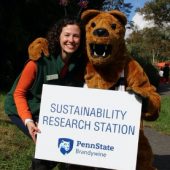
Abstract: In Fall 2017, Penn State Brandywine kicked off an initiative titled Sustainovation, emphasizing programming and community collaborations through sustainability and innovation. The campus identified Tyler Arboretum as a community partner to work with to assist in advancing their education and outreach goals. Students from across the campus came together at the beginning of the semester for an initial meeting to be introduced to the United Nations Sustainable Development Goals (SDGs), to meet the community partner and to hear about the semester project of adding sustainability education to the arboretum’s fall festival Pumpkin Days. In addition, a validated survey from Biasutti & Frate (2017) was given to the students to define their attitudes towards sustainable development before working with this partner and the project. The survey addresses four sustainability constructs of Environment, Economy, Society, and Education. At the end of the semester, the same survey was given to student participants in this Sustainovation project for Tyler Arboretum. Aggregate data show that there is a statistically significant difference in student attitudes at a minimum 90% confidence level (t-test) for eight of the twenty survey statements in the constructs of Environment, Economy, and Society.
Continue Reading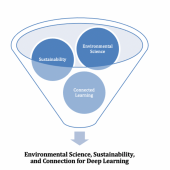
This comparative case study of teaching and learning experience explores connected learning design principles to improve engagement in higher education and weave sustainability practice into introductory environmental science curriculum through the integration of community, place, peer support, networking, and technology. For this study teaching and learning took place in multiple settings, online and in a brick-and-mortar classroom, and in students’ communities. We set out to ask: In what ways might the implementation of connected learning principles be used to improve engagement and weave sustainability into environmental science curriculum, broaden interest in science literacy, and encourage community action in introductory higher education courses? Comparative analysis and collaborative autoethnography methodologies were utilized to compare professor experiences for analysis and synthesis of patterns. Findings suggest that connected learning curriculum can broaden access to science, improve engagement, and help weave sustainability into a variety of courses by presenting students with relevant applied opportunities, connections and critical thinking about place and community, peer support and intergenerational connections, networking, and technology. Students can also gain a sense of agency and career relevance especially important to students who might otherwise feel they cannot “do science” or make a difference in a changing world. Lastly, this approach can improve instructors’ teaching experiences by relieving time and content constraints to incorporating sustainability into other course subjects as students submit more interesting passion-driven work, and are encouraged to network with and learn from individuals (family, community, and scientists) outside the classroom they may not have otherwise sought out.
Continue Reading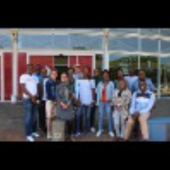
Abstract: Reporting to the public on climate change impacts, adaptation, and mitigation requires journalists to be equipped to engage with a wide range of technical content in order to communicate it in an accessible and engaging way. Recognizing the need for journalists from a wide range of backgrounds, including those from community newspapers and radio stations in South Africa, to be able to undertake this task, the South African Department of Environment Affairs in partnership with GIZ commissioned the authors to develop and deliver a four-day climate change reporting training programme. This paper presents an overview of the structure and content of the course, and details the reflections after undertaking such an endeavor.
Based on the lessons learned, and an awareness that this kind of training may take place in the context where working community-level journalists may have a low knowledge base (of both the journalistic craft, as well as the content of climate science) the following recommendations emerge: scientific training may need to be combined with basic journalistic training (depending on the participants); learning-by-doing is central to journalists building their capacity in climate reporting training; and mother-tongue delivery of material is critical to the success of such technical training courses.
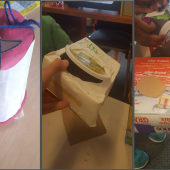
Abstract: This case study illustrates a cross-curricular learning experience, anchored in standards, where teachers and students actively engaged in co-constructed, inquiry-based learning and design thinking. The particular question this case study addressed was “How might students connect with environmental citizenship in authentic ways through media literacy experiences?” Specifically, the case study invited primary level learners to engage in a multimodal experience that was anchored in media literacy concepts and process. A pedagogical approach rooted in media literacy theory subsequently empowered students to make positive environmental changes in their communities and develop citizenship skills for the future. The project sought to develop awareness of sustainability through analysis, re-design, and production of snack food packaging. Educator reflections offer ideas for project improvement, such as producing for a wider audience, offering more choice, and making broader subject connections. This case study has implications for practice by demonstrating that, through various stages of scaffolding and integrated lesson design, young children are capable of applying sophisticated media literacy theory, inquiry, and design thinking to meet multiple curriculum standards.
Continue Reading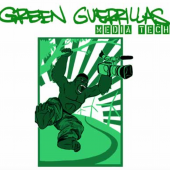
Abstract: The Green Guerrillas Youth Media Tech Collective, a community organization based in Ithaca, New York, set out to define sustainability in their own terms by giving a diverse group of local adolescents the opportunity to engage subjects of environmental and social justice through digital media production within the auspices of a unique afterschool job-training program. Interviews with youth participants and adult mentors illustrate key concepts for environmental and sustainability educators desiring to facilitate engaging learning environments utilizing multimedia. Excerpts of their interviews provide a lens into the workings of a non-formal educational environment that explicitly embraced media literacy, media arts production, and community engagement to advocate for issues of justice and sustainability while facilitating opportunities for ecological learning. This case study highlights the potential of digital storytelling to foster students’ knowledge retention, connection to nature, sense of empowerment, and ability to create positive change in their communities.
Continue ReadingThis editorial overview provides an introduction to this special Journal of Sustainability (JSE) issue devoted to water and climate change, which is being released during United Nations World Water Day 2020. The article contextualizes some of the water security risks that are exacerbated by climate change, such as increasing floods and droughts. This piece further provides a brief overview of the articles in the special water and climate issue of the JSE.
Continue Reading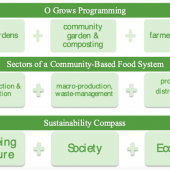
Abstract: This program feature documents our reflections on how the work of O Grows, is, or more accurately has become, increasingly sustainability-oriented. O Grows is a non-profit, community-university partnership with the mission to leverage the local capacity in service of community food needs. Specifically, we focus here on how engagement with an increasing number of sectors of the local food system, as we work toward this mission, has demonstrated a commensurate increase in alignment with the cardinal directions of the sustainability compass—attention to Nature, Society, Economy, and Wellbeing. We have realized, as O Grows has evolved, that keeping the program going and attending to sustainability are one and the same. As such, we argue the sustainability compass is a useful heuristic not only for reflection after-the-fact but also for partnership planning.
Continue Reading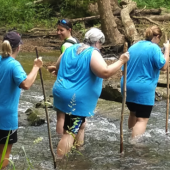
Abstract: The purpose of this article is to provide key aspects and learning outcomes associated with the Math of the Mountains Project. Math of the Mountains was a year long grant project that engaged 60 K12 mathematics teachers in the key concepts and applications of place-based learning and mathematics instruction. Through online coursework and peer support, a four-day immersive field experience, and teacher led field experiences, participants applied elements of PBL to create lesson activities that support real-world learning and problem solving scenarios.
Continue Reading
Abstract: A United Nations international collaboration between the Education for Sustainable Development (ESD) and the Principles for Responsible Management Education (PRME) resulted in the creation of Sulitest® (aka Sustainability Literacy Test) an open, online training and assessment tool freely available to higher education institutions globally. This study analyzes the effectiveness of the newly developed Sulitest® to not only measure sustainability literacy of higher education student populations, but also act as a catalyst for boosting affective learning outcomes by: (a) generating interest in sustainability-related issues, (b) improving sustainability-related understandings, and (c) enhancing students’ interests in the subject matter. In order to do so we present a two-phase, exploratory mixed-method pilot study. Preliminary results from this pilot study reveal Sulitest is a useful tool for not only assessing sustainability literacy but also spurring student interests and motivations in sustainability-related subject matters. Findings, discussion and limitations are provided.
Continue Reading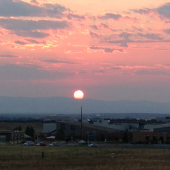
Abstract: This paper describes and explains findings from an exploratory, interpretative qualitative case study that examined how a residential graduate program in science education, based in a wilderness area, supported the development of citizen educators. Data collection over a three-year period included 16 in-depth interviews with administrators, faculty, and graduate students; observations of class activities and campus community meetings; and document analysis of curriculum materials. Analysis of the data revealed how the culture of the campus community encouraged students to become citizen educators.
Continue ReadingAbstract: The author examines the role and influence of a place-based Environmental Literature and Writing class on her undergraduate students’ perception of their personal position within their immediate and extended environments. Further, the author aims at gaining a better understanding of what course elements the students found particularly valuable and effective in the realization of their agency within our environmental context, and what role writing played in the students’ reflections and examinations of the complex relationships between self, nature, and matters pertaining to sustainability and the future of our natural habitats. By assessing student writing, collecting questionnaires, and conducting open-question interviews, the author explores her students’ impressions and experiences of navigating global and local environmental issues through a Humanities-based course.
Continue Reading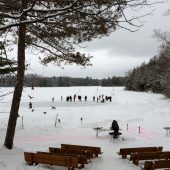
Abstract: In this article, we examine the collaborative efforts of university-employed folklorists with Waaswaaganing Anishinaabe (Lac du Flambeau Ojibwe) teachers and community leaders in what is currently known as northern Wisconsin. Focusing on the Ojibwe Winter Games—an annual weeklong event in February for middle school students that aims to revitalize traditional competitive games—we suggest that decolonizing sustainability education requires recognition that sustainability is pluralistic and culturally specific. Educators must facilitate a restorative systemic shift towards Indigenous sustainabilities through Indigenous-centered pedagogies and methods of knowledge production. In order to accomplish such a shift, our responsibility as academics and public folklorists must always be to the Indigenous communities with whom we work. We explore the role of non-Indigenous collaborators in Indigenous-led decolonization efforts, in developing educational systems that support and sustain Indigenous knowledge systems, and in the repatriation and rematriation of land, language, and culture.
Continue ReadingAbstract: Since the 1990s research has been telling us that indigenous students do better in school when they are connected to their cultures. Our experience affirms studies concluding that students who have strong connections to their culture are more resilient and have a stronger sense of efficacy.
Continue Reading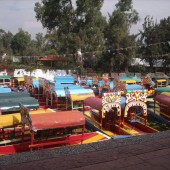
The educational experience described in this article was developed in the course “Social and Cultural Contexts of Teaching” for the Sociology of Education bachelor’s degree at the National Pedagogical University, Mexico. In this course, students are expected to develop favorable attitudes toward the environment. The student’s defined environmental problems made a diagnosis and elaborated a case study, to discuss concrete solutions in their community. The educational experience included several moments: framing, joint planning of individual and group activities, and development of the case study. The balance of the results of the course was favorable; the group learned to work cooperatively, mutual trust prevailed within the teams, group agreements were respected, the group goal was clearly defined, and a case study was delineated and developed.
Continue Reading
La experiencia educativa que se describe en este artículo se desarrolló en el curso “Contextos sociales y culturales de la enseñanza” de la licenciatura de Sociología de la Educación en la Universidad Pedagógica Nacional, México. En este curso, se espera que los estudiantes desarrollen actitudes favorable hacia el medio ambiente; los estudiantes delimitaron problemas ambientales, hicieron un diagnóstico y elaboraron un estudio de caso, para discutir soluciones concretas. Desde el reconocimiento de la crisis ambiental y un problema ambiental específico, los estudiantes desarrollan un estudio de caso de un problema ambiental de su comunidad. La experiencia educativa comprende varios momentos: encuadre, planificación conjunta de actividades individuales, grupales y desarrollo del estudio de caso. El balance de los resultados del curso fue favorable; el grupo aprendió a trabajar de forma cooperativa, prevaleció la confianza mutua dentro de los equipos, se respetaron los acuerdos grupales, se definió claramente el objetivo del grupo y se delineó y desarrolló un estudio de caso.
Continue Reading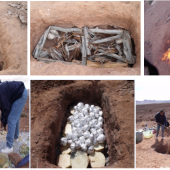
Abstract: For millennia, education for the Hualapai Tribal people was learned through intergenerational lessons taught with the family. This provided younger generations with the skills and knowledge needed to thrive in harsh desert environments. Over the past centuries tribal education has undergone numerous transitions. For the past twelve years the Hualapai Ethnobotany Youth Project has implemented an intergenerational learning program with the elders and youth of the tribal community to instill the centuries old knowledge that could only have been obtained through generations of experience. The program looks to new ways in modern times to teach the old ways in maintaining the continuity of knowledge that only the grandparents can remember.
Continue Reading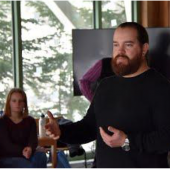
Ojibwe education is used at Conserve School, an environmental semester school, to help high school students better understand diverse perspectives on stewardship and to explore the history, cultures and place of the Northwoods of Wisconsin. In the Environmental Stewardship class, students learn about indigenous history, culture and environmental perspectives from a local Ojibwe forester. The students use this perspective to help them appreciate their place at Conserve School and explore their own environmental ethics. Students also participate in Ojibwe seasonal celebrations to better comprehend how place and people are interrelated.
Continue Reading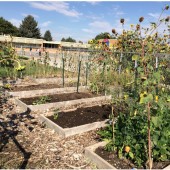
This essay describes a project in which a 4th grade class joined forces with a university class to study and produce as theatre Paul Fleischman’s Seedfolks, an inspiring story of a diverse group of community residents who transform a vacant urban lot into a wonderful community garden. In addition to the arts component, the two teachers unexpectedly found an opportunity to encourage sustainability of education when their students embarked on a pen pal correspondence.
Continue Reading
The Olympic Games are the ultimate mega sporting event with not only hundreds of thousands of athletes, but also hundreds of thousands of spectators, volunteers, media, and security personnel. The Olympics concentrate a large number of people in a confined space (one city or even specific areas within the city) over a relatively small period of time (two weeks), thus introducing inevitable hardship to the natural environment. This case study focuses on the challenges Rio faced in preparation to stage and host the 2016 Summer Olympics Games, and at the same time provide an environment safe to all. More specifically, the case focuses on the water quality in Rio and the associated health risks for athletes competing in the open water events. This case study provides students with knowledge about the history of environmental sustainability in the Olympics and prepares them for a career in a global industry that is increasingly focusing on and implementing environmental initiatives.
Continue Reading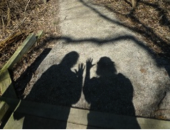
This article focuses on ‘Hope and a Hike’ a women’s walking group in Ann Arbor, Michigan. The group uses an online Meetup to bring women together for weekly one-hour hikes which include information about a local positive conservation initiative (the hope component). It combines exercise, health gains, and social opportunity, with knowledge, positive local conservation success stories and experience in forested areas. The goal is to awaken a connection to the natural environment with hope and a desire to care and take action for the environment. Participants are women, mostly ages 35-70. This case example includes how the group relates to research on: benefits of walking in nature, awe, women, hope, connection to nature, pro-environmental actions and relational activism. Details about hope topics and ideas for expanding the hikes could be used in informal education as well as in course development.
Continue Reading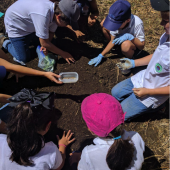
This article describes a sustainable agriculture workshop designed and led by Master’s students to support university-community engagement in Costa Rica. Our project had three transformative goals: 1) to empower Master’s students as educators, 2) to share food security knowledge with community youth, and 3) to strengthen our university-community relationships for knowledge dissemination. For other scholars who wish to apply principles from our Master’s student-led workshop within their local context, we describe our recommendations as well as areas for improvement regarding our three goals. Despite our workshop successes, it was a volunteer project that competed with the academic workloads of the students and the professor. We suggest that community engagement form part of regular academic obligations and courses to increase its accessibility and to provide more opportunities for Master’s students to transition into educators and practitioners before entering their fields of work.
Continue ReadingAbstract: The concept of a Green School is contested, negotiable, and complex, and this study considers stakeholders’ perspectives of this concept. A total of 21 stakeholders (principals, teachers, and parents) from three award-winning green preschools in three different societies were interviewed to discern their understanding of the notion of “green school”. The award-winning green schools were located in Bali (a developing region in Indonesia, a developing Eastern country), in Berkeley (a developed city in the United States, a developed Western country), and in Hong Kong (a developed city in a China, that that acts as a meeting point of East and West). They were selected as they are considered to be the pioneers in this field in their respected regions. Semi-structured interviews were conducted with principals, teachers, and parents at the sites over a 10-month-period. Three concepts related to the Green School, namely Green Education, Green School, and Green Building, were explored. The stakeholders were asked about their preferences in relation to having children educated inside a Green Building or receiving education utilizing a Green Curriculum. Results indicated that stakeholders’ perceptions about the Green School concept were inconsistent. However, they were aligned with the ‘green’ message that each school tries to convey. Stakeholders, regardless of their cultures, agreed consistently that they preferred preschools implement a Green Curriculum over occupying a Green Building. Implications and future directions for research on Green Schools are discussed.
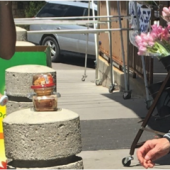
Abstract: Five years after the City of Aspen Waste Ordinance went into effect, this study examines its effectiveness and current shopper behavior. The ordinance banned single use plastic bags from supermarkets and placed a $0.20 fee on single use paper bags. The policy was supported by outreach measures such as distributing reusable bags and education. Results show that single use paper bag sales per $100 of supermarket revenue ranged from a low of 0.59 bags/$100 revenue in 2012 to high of 0.78 bags/$100 revenue in 2014. This rate remained relatively constant between 2014-2016. These low values, combined with the observation that only 15% of shoppers leaving supermarkets were observed using single use bags, indicates that a substantial number of customers choose reusable bags or no bags at all. In contrast, observations made at a nearby supermarket with no bag policy in place indicated that 77% of shoppers left with single use bags. Surveys and interviews indicated that while some people initially opposed Aspen’s bag policy, the community has now generally adapted to and accepted it. These results suggest a level of success in using a policy lever, such as Aspen’s Waste Reduction Ordinance, to advance sustainable behavior.
Continue ReadingThis case study shares a unique educational experience that combined sustainability and design education with international partnerships that sought to investigate and visually analyze relationships between housing design and water infrastructure in both Pittsburgh, PA (USA) and urban centers of Indonesia. This project built upon an existing foundation of international relationships between faculty and institutions within a consortium framework. The project used a pre-course and a faculty-led student trip to establish relationships among faculty and students based in the United States (US) and Indonesia and to determine preliminary shared research goals to be built upon for future research collaborations that can attain a deeper and longer-term relationship. Students who participated in these courses refined their visual communication skills, gained a valuable global perspective on urban water management, were exposed to participatory photography as a research tool, and were strongly affected by their cultural experiences in Indonesia. Peer work between US and Indonesian students provided opportunities for students to exchange ideas and perceptions about the observed environment, which are influenced by their familiarity and unfamiliarity with the setting. The experience of this project can serve as a primer for the sustainability educator who is interested in interdisciplinary and international educational endeavors.
Continue ReadingAbstract:
This paper describes a role-playing, negotiation “game” based on the Xayaburi Dam in Laos. We have used this activity in our graduate programs as a tool for bringing to life the complexities of decision-making around natural resources, economic development, and sustainability. Over the past several years of using the game in the classroom, we have found it to be an effective means of exposing students to the kinds of opportunities and constraints that different stakeholders face as well as the kinds of communication and negotiation tactics they might use to influence outcomes. We provide background on the real-world situation on which we based the fictional scenario for the game and discuss the learning outcomes we have observed.
Abstract
The study assesses the extent to which curriculum of secondary schools in Tanzania addresses sustainable education through integration of environmental education. Specifically, it evaluates the subjects used to deliver environmental education in secondary school. Also the study found out perceptions, challenges, and recommendations for implementing environmental education. This research adopted a case study, qualitative approach to study the subject matter in its natural settings while making sense of the contents of the subjects and perceptions of stakeholders. Cross sectional, stratified sampling involved both students from all classes, experienced teachers in geography and biology and a head teacher as well. It was found that most environmental education competencies are delivered mainly through the geography subject, and some in biology using an integrated teaching approach. Students and teachers were fairly knowledgeable and had understanding of basic environmental issues. Main challenges facing implementation of environmental education included an integrated learning approach, inadequate knowledge on environmental education, lack of support from each other and from school administration, and cultural myths and beliefs.
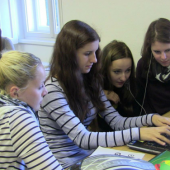
Abstract: The aim of this case study was to develop, apply and evaluate a science-education workshop format to communicate climate change to young people. Based on current theory in climate change communication and Education for Sustainable Development, the workshop has been applied in different contexts with more than 300 children and teenagers. A specification of the consecutive steps should help practitioners to use the workshop in their contexts. While results of the application of the workshop should give an insight into what can be expected from the workshop, an impact assessment of the participants who took place in the workshop outlines the effects it has on students. This paper does not only provide hands-on advice on how theoretical climate change communication knowledge can be translated into action, it also outlines the impacts of the described workshop.
Continue Reading